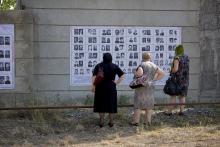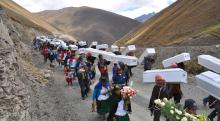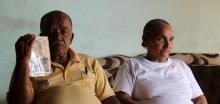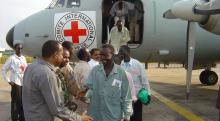Case prepared by Therese O’Brien, Daniel Bergmann, Holly McDaniel, and Tom Jarvis, J.D. students at Emory University School of Law, under the supervision of Professor Laurie Blank, Emory University School of Law.
A. LINAS-MARCOUSSIS AGREEMENT
1. At the invitation of the President of the French Republic, a Round Table of the Ivorian political forces met in Linas-Marcoussis from 15 to 23 January 2003. It brought together the following parties: FPI, MFA, MJP, MPCI, MPIGO, PDCI-RDA, PIT, RDR, UDCY and UDPCI. The conference was chaired by Mr. Pierre MAZEAUD, assisted by Judge Keba Mbaye, former Prime Minister Seydou Diarra and facilitators appointed by the UN, the African Union and ECOWAS [Economic Community of West African States].
[...]
2. The Round Table welcomes the cease-fire made possible and guaranteed by the deployment of ECOWAS forces supported by French forces, and demands strict compliance with it. The Round Table calls on all parties immediately to put a stop to all exactions and consecrate the peace. It calls for the immediate release of all political prisoners.
3. The Round Table reiterates the need to maintain the territorial integrity of Cote d'lvoire and respect for its institutions and to restore the authority of the State. It recalls its commitment to the principle of democratic accession to and exercise of power. To this end it agrees as follows:
[…]
i) The Government of National Reconciliation will take the necessary steps to ensure release and amnesty for all military personnel being held on charges of threatening State security and will extend this measure to soldiers living in exile. The amnesty law will under no circumstances mean that those having committed serious economic violations and serious violations of human rights and international humanitarian law will go unpunished.
[…]
N.B.: The Linas-Marcoussis agreement was not fully implemented by the parties to the conflict.
B. PRESIDENT APPROVES AMNESTY LAW FOR REBELS
ABIDJAN, 4 July 2003
President Laurent Gbagbo said on Friday he had approved a draft amnesty law for rebels occupying the north of Cote d'Ivoire and urged parliament to pass it quickly.
Gbabgo [sic] made the announcement at a ceremony where government and rebel military leaders signed a joint declaration that formally ended a state of military war in the country.
Gbagbo's approval of the amnesty law clears the way for the rebels to begin a delayed process of demobilisation and disarmament. It also puts the peace process back on track following a rebel threats to suspend their participation in Cote d'Ivoire's government of national reconciliation in protest at an attack on one of their leaders on 27 June, while he was visiting the headquarters of state television in Abidjan.
[…]
Colonel Sumaila Bakayoko, the chief of staff of rebel forces, said after signing the formal declaration that war had ended: "We are now bound to a logic of peace and reconciliation. Despite the incidents which have occurred, I can say that we can only be happy with ourselves (for what has been achieved). "
[…]
The draft amnesty law, which was approved by the cabinet of prime minister Seydou Diarra on Thursday, covers all civilians and military personnel who sought to overthrow the government after the controversial presidential elections of September 2000, in which Alasanne Ouattarra, a former prime minister, who was popular in the north of the country, was banned from standing.
[…]
However, it specifically excludes economic crimes, violations of the international humanitarian law and "serious violations" of human rights.
Government sources said the exact definition of "serious violations" was likely to be a subject of lively debate when the amnesty bill goes before parliament.
The amnesty specifically covers acts of desertion and military rebellion, paving the way for soldiers and policemen who joined the rebels to be reintegrated into the security forces.
[…]
The government and rebels signed a French-brokered peace agreement in January which paved the way for the formation of a government of national reconciliation, incorporating nine rebel ministers, in April.
Since then a ceasefire has been respected in most of the country, except in the far west, near the Liberian border, where French and West African peacekeeping forces moved in at the end of May to restore order.
[…]
C. AMNESTY BILL: LETTER FROM COTE D’IVOIRE TO THE UN SECURITY COUNCIL
[…]
I have the honour to inform you that, on Wednesday 6 August 2003, the Ivorian Government adopted the amnesty bill by 179 votes to 2, with 1 abstention.
[…]
The almost unanimous acceptance of the amnesty bill by the Ivorian parliamentarians clearly demonstrates the profound willingness of the people of Côte d'Ivoire to put a definitive end to the instability which has blighted the country since December 1999.
[…]
Annex to the letter dated 12 August 2003 from the Permanent Representative of Côte d'Ivoire to the United Nations addressed to the President of the Security Council
Act No. 2003-309 of 8 August 2003, granting amnesty
[…]
Article 2
Amnesty shall be granted as a matter of course in respect of offences committed against State security and national defence, regardless of their perpetrators, co-perpetrators or accomplices, whether military or civilian agents, and whatever their nature and the penalties incurred or liable to be incurred on account of their commission, in particular those offences provided for and penalized in articles 158 to 168 of the Penal Code, committed by Ivorian nationals on national territory or in exile during the events described in article 3.
Amnesty shall also be granted in respect of offences committed during the attempted coup d'état of 18 and 19 September 2002 and the ensuing armed rebellion, and in respect of military offences linked to all the events cited, namely, insubordination, post desertion and desertion.
Amnesty shall also be granted in respect of collateral damage caused by operations to defend republican institutions carried out by the defence and security forces.
Article 3
Amnesty shall be granted in respect of offences committed during the following events:
- 17 and 18 September 2000 (attack directed against State authority);
- 24, 25, 26 and 27 October 2000 (attack directed against State security and public order);
- 4 and 5 December 2000 (disturbance of public order);
- 7 and 8 January 2001 (attack directed against State authority and participation in armed gangs);
- 10 February 2001 (attack directed against State authority and unlawful possession of arms, organization of armed gangs);
- 18 and 19 September 2002 (attack directed against State authority, murder, participation in armed gangs).
Article 4
This Amnesty Act shall not apply to:
(a) Economic offences;
(b) Offences which constitute serious violations of human rights and international humanitarian law;
(c) Offences classified by the Ivorian Penal Code as crimes and offences against the law of nations, crimes and offences against individuals and crimes and offences against property, including those specific offences provided for and penalized in Act No. 88-650 of 7 July 1988, as amended by Act No. 89-521 of 11 May 1989, on the suppression of offences in the area of the marketing of agricultural produce and Act No. 94-497 of 6 September 1994 suppressing the unlawful export of agricultural produce;
(d) Offences described in articles 5 to 8 of the Rome Statute of the International Criminal Court and the African Charter of Human and People's Rights.
[…]
D. REBEL RELEASE PRISONERS, REFUSE TO RETURN TO ABIDJAN
Rebels who control northern Cote d'Ivoire on Sunday freed 40 government soldiers held prisoner for over a year, but again ruled out a quick return to Abidjan to rejoin the government of Prime Minister Seydou Diarra.
[…]
The freed soldiers were handed over to the International Committee of the Red Cross in the presence of West African peacekeepers, French and Ivorian army representatives and United Nations observers, by the Chief of staff of the rebel "New Forces", Colonel Soumaila Bakayoko.
Thirty-three of the men climbed aboard a French army aircraft in Korhogo for a short flight to Bouake, where the aircraft picked up another eight freed men. It then flew to Abidjan.
Col Bakayoko told IRIN the decision to release the men was reached over three months ago at a meeting between the “New Forces”, the UN [United Nations], ECOWAS [Economic Community of West African States], French and Ivorian army representatives. It was done in accordance with an amnesty passed by the Ivorian government.
"The release should have been done earlier when the Ivorian army released six of our men but there was a delay," Col Bakayoko said.
"These men were captured after combat in Bouake in October 2002. They were good soldiers who were doing their job. It was not their fault...so we decided not to treat them as prisoners but as brothers in arms. They were treated properly," he added.
[…]
E. IVORY COAST: 40 DETAINEES FREED
Geneva/Abidjan (ICRC) – On 7 December 2003, 40 Ivorian military personnel freed by the Forces nouvelles were handed over to the International Committee of the Red Cross (ICRC) at Korhogo and Bouaké, in the presence of representatives of the ECOWAS mission and French forces taking part in Operation Licorne.
The persons concerned were flown to Abidjan on board aircraft provided by the French forces, where the ICRC handed them over to the national armed forces of the Ivory Coast.
Earlier, ICRC delegates conducted private interviews with each detainee, to identify [them] and check on [their] health. All detainees returned to Abidjan of their own free will.
The ICRC has access to all persons being held in Ivory Coast in connection with the situation obtaining there since 19 September 2002. Following the release of these 40 detainees, the ICRC will be continuing its efforts to assist both military and civilian personnel deprived of their freedom.
F. IVORY COAST DETAINEES RELEASED
[Source: International Committee of the Red Cross, “Ivory Coast: Detainees Released”, 5 March 2004, available at p. 48, https://library.icrc.org/library/docs/DOC/CDP_2004_ENG.pdf]
Eight members of the Ivorian defence and security forces were released by the Forces nouvelles on 4 March and handed over to the International Committee of the Red Cross (ICRC). The operation took place in Man, in the west of the country, in the presence of representatives from the ECOWAS [Economic Community of West African States] mission in Ivory Coast (ECOMICI), French forces from Operation Licorne, and the United Nations Mission in Ivory Coast (MINUCI).
Two ICRC delegates, one of them a doctor, spoke with each of the detainees in private before their release in order to assess their health and ensure that they did wish to be taken to Abidjan. The delegates then travelled with them on an aircraft provided by the French forces to Abidjan, where they were handed over to the Ivorian armed forces commander of joint operations.
The ICRC took part in a similar operation on 7 December 2003, when 40 servicemen were brought back to the capital. On both occasions, the detainees were released on the decision of and with the consent of all authorities concerned. An amnesty law passed on 6 August 2003 provides the basis for the release of persons held for offences against State security and national defence.
Following this latest handover operation, the ICRC considers that all members of the Ivorian defence and security forces who were arrested as a result of the armed conflict that broke out on 19 September 2002, and whom it had visited, have now been released. The organization will continue its work on behalf of other people who remain deprived of their freedom as a result of these events.
Discussion
I. Classification of the situation and applicable law
1. How would you classify the situation in Cote d'Ivoire between 2002 and 2004? What additional information would you need to make such a determination? (
GCI-IV, Art. 3;
PII, Art. 1 )What is the applicable law? Are non-State armed groups bound by IHL? (
GCI-IV, Art. 3,
PII, Art. 2)
II. Release of persons detained in relation to the armed conflict
2. What does IHL say about persons detained in relation to armed conflicts? What does IHL say regarding the status and treatment of these individuals in international and non-international armed conflicts? (
GC I-IV, Art. 3;
GCIV, Arts 4 and
27;
PI, Arts 44 and
75;
PII, Art. 4)
4. When shall persons deprived of their liberty in a non-international armed conflict be released under IHL? (
CIHL, Rule 128;
PII, Art. 6(5))
III. Elements contributing to respect for IHL
5. (Document A) What impact did the signing of a peace agreement have on the parties to the conflict? Do you think this peace agreement can be conducive to more respect of IHL by the parties? In your opinion, can the intervention of third parties such as France and MINUCI in the making of this peace agreement incite the parties to the conflict to respect the terms of this agreement as well as IHL?
6. Seeing documents A and B, which factors made the release of these detainees possible? In your opinion, what impact did the adoption of the Amnesty Law have on the release of these prisoners? Do you think the detainees would have been released had a peace agreement not been concluded?
7. In document C, six members of Forces Nouvelles have been released. Following this release, 40 members of the Ivorian armed forces were freed by the group. In your opinion, did the release of the six members of Forces Nouvelles have an influence on the release of the 40 members of the Ivorian armed forces? Why?
8. (Document C) In your opinion, why did the representative of Forces Nouvelles add that they had treated the captured soldiers as “brothers in arms”? In your opinion, what factors brought about this decision by the group? What does that suggest about the group’s general efforts and aims?
9. (Documents D and E) In which way did the ICRC help with the repatriation process? Do you think the involvement of the ICRC had an influence on how the detainees were treated before repatriation to Abidjan?






